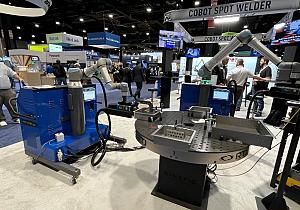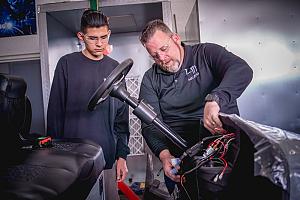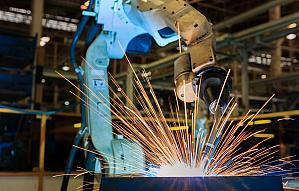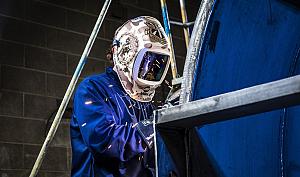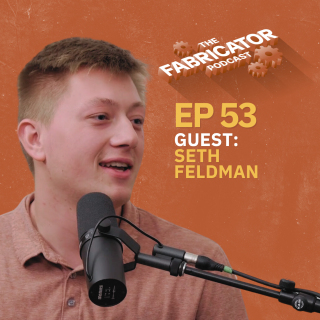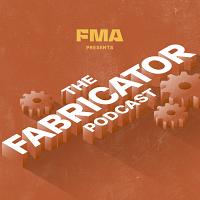A Gen Zer's take on the trades and representing the toolbelt generation
In This Episode
Learn more about FMA's Pipe + Tube Conference.
Learn more about 2024 ALAW.
Learn more about podcast sponsorship opportunities.
Learn more about Wertzbaugher Services.
TRANSCRIPT
Dan Davis:
Dan Davis: Anything else you want to add?
Seth Feldman: Not really, other than I'm going to save the manufacturing industry.
Dan Davis: Yeah, right.
Seth Feldman: No, I'm just kidding.
Gareth Sleger: I wish we had theme music for that. He's going to walk out of here with way more pressure on his shoulders than he came in with.
Dan Davis: I can't sleep, Doc. Why? Because I have to save manufacturing.
Sara Spring: If you're involved in the pipe and tube industry, you won't want to miss the Pipe and Tube Conference this May in Omaha, Nebraska. This event is an excellent opportunity to connect with industry experts, stay up-to-date with the latest technologies, and explore new business opportunities. You'll leave the conference with a wealth of knowledge and new connections to help your business succeed. So, mark your calendar and join us in Omaha for the Pipe and Tube Conference. Register today at FMAMFG.org. And now, back to the episode.
Dan Davis: Hello. This is Dan Davis with the Fabricator Podcast. To my left is Lincoln Brunner.
Lincoln Brunner: Hello.
Dan Davis: And today's guest is Seth Feldman, former high school quarterback, former high school point guard, and now successful metal-fabricating professional with Wertzbaugher Services. You might find it unusual. He's young. We don't talk to too many young people on here.
Gareth Sleger: He's 22.
Dan Davis: Yeah. That's very young. Yeah. I think we're going to find out what he found out in terms of what he likes about metal fabricating and some of the things he's doing. It's a pretty good conversation. If you stick around long enough, we'll have opinions on Iowa offensive football, which I think two of you might be interested in. And corn.
Gareth Sleger: And corn?
Dan Davis: Yeah. Pork tenderloin sandwiches.
Gareth Sleger: And welding.
Dan Davis: Yeah, we went all over this.
Lincoln Brunner: Oh, yeah, we talked about welding too. We did. We did talk about welding.
Dan Davis: But there's also a reference you made to a welding training class you took back in the day.
Lincoln Brunner: Back in the day, FMA would send all of us to Hobart Welding School in Troy, Ohio, just to get our hands dirty with what welding is. It was fun. It taught us everything we didn't know about welding and it was pretty humbling, actually, because you'd get in there and you'd get a stick in your hand and the instructor would say, "Okay, what you want to do is get your location, flip your mask down, strike your arc, and get going with how we showed you how to do it." And inevitably, day two, day three at the latest, the instructor would say, "Okay, so who didn't flash themselves?" And no one would raise their hand, because you just wouldn't inevitably screw up and strike the arc while you're still looking at it with your bare eyes. That was humbling, but it was also extremely instructive. Right? Because it was like, "Okay, this is what people are talking about when they're writing our articles." And so, yeah, it was a lot of fun.
Dan Davis: So, we didn't do it at the same time, but I took the same class and it was always interesting, not only from the standpoint of being introduced to welding processes, but also getting a feel for what welders go through in training.
Lincoln Brunner: Yes.
Dan Davis: And I think that it's turned out to be an interesting conversation. Do welders really need to learn oxy-fuel welding? And I think it's a decent conversation to have. I'm always more about well-rounded education, just about learning things.
Lincoln Brunner: Well, yeah. And the other thing about that school is, you are instructed hands-on. This is what makes a good weld bead, and this is what's going to break when you're done. And you don't want any porosity in there. You don't want bubbles. You don't want it to look like this, you want it to look like that. And so, by the end of the week, we're laying down fairly decent beads. But you realize this is a lifelong process of getting this perfect.
Dan Davis: Yeah. That whole conversation stemmed from that welding just isn't easy. And Seth was talking about how it took him about a good year-plus to figure out how to lay down a good big weld. So, it was interesting. The class, was it called Welding for the Non-Welder, would you say?
Lincoln Brunner: Yes. Welding for the Non-Welder. That's right.
Dan Davis: The mix of people in there, I'll never forget it. A couple of welding folks from one of the big welding companies sent their app engineers just to get a quick learning, a quick background on welding.
Lincoln Brunner: Go get your feet wet.
Dan Davis: Also, a representative for the US Coast Guard.
Lincoln Brunner: No way.
Dan Davis: It was like being put in charge of repairs. Yeah, it was just a couple ... I remember an ... I call him an old timer, but I'm probably his age now. But that was back then. But he had all these stories. It was like story time, like, "Well, I've seen this out there." And you talk about flash, he told the story about some guy watching a welding process from over a mile away, ends up getting a burn in his eye.
Lincoln Brunner: Oh my gosh.
Dan Davis: He was not taking care of that.
Lincoln Brunner: Fire in his retinas.
Dan Davis: Yeah. It's something you definitely remember, and something that I think really helped make us a little bit better at our job in covering this industry.
Lincoln Brunner: Oh, absolutely. And it makes you cognizant of what they're talking about, what's important to a welder.
Dan Davis: Yeah.
Lincoln Brunner: As opposed to just any old topic you might want to bring up. You understand, "Oh, this is what's pertinent to a welder, and making sure they do their job well."
Dan Davis: At the very least, also respectful of what those that guys do.
Lincoln Brunner: Absolutely.
Dan Davis: Yeah, because as we record this, we just plotted an article on the website about how teaching welding right at the beginning needs to implement safety standards.
Lincoln Brunner: Yes.
Dan Davis: A lot of people didn't take that in consideration.
Lincoln Brunner: Yeah.
Dan Davis: It's definitely better to go home with all your fingers.
Lincoln Brunner: Yeah.
Dan Davis: Well, we get a lot of, "I'm not sure you'll burn your fingers off when working with ice."
Lincoln Brunner: And working ice. Yeah.
Gareth Sleger: The most feedback that we get is when we run a Getty image of not the safest welding practices, and people are quick to point those out. Yep. Use your PPE, folks.
Lincoln Brunner: Yes.
Dan Davis: Keep us out of trouble.
Lincoln Brunner: Yes, please.
Dan Davis: This is way more serious than the conversation we're going to have with Seth. In fact, you probably should have taken a hint from this conversation and applied that to our conversation with Seth. But nonetheless, it's very enjoyable and entertaining. So yeah, enjoy. Enjoy?
Lincoln Brunner: The look of disgust.
Dan Davis: Enjoy, enjoy.
Lincoln Brunner: Enjoy off.
Sara Spring: Mark your calendars. The 31st Advanced Laser Applications Workshop will take place from June 25th to the 27th at the Suburban Collection Showcase in Novi, Michigan. This event connects manufacturers and suppliers in automotive, aerospace, agriculture, and the fabrication spaces. Enjoy three days of presentations from leading experts, cutting-edge demonstrations and fascinating open houses. Discover the latest advancements and applications that are shaping the future of the industry. Visit FMAMFG.org to learn more. And now, back to the episode.
Dan Davis: Welcome back to the Fabricator Podcast. Today's guest, Seth Feldman of Wertzbaugher. Did I pronounce it right?
Seth Feldman: Yes, sir.
Dan Davis: Wertzbaugher Services?
Seth Feldman: Wertzbaugher Services.
Dan Davis: In ...
Seth Feldman: West Liberty, Iowa.
Dan Davis: There you go. Which is near ...
Seth Feldman: Southeast of Iowa City, about 20 minutes.
Dan Davis: Hawkeye fan?
Seth Feldman: Big Hawkeye fan.
Dan Davis: Okay. We'll get into their offense. Football, offensive issues later. Controversy awaits. Hang on.
Lincoln Brunner: We can talk women's basketball.
Dan Davis: Or Caitlyn. Yeah. That's better. It's a lot better.
Lincoln Brunner: It is better, but it's funny with the football thing.
Dan Davis: Today Seth has joined us. People might be familiar with the Wertzbaugher name, as Lisa Wertzbaugher, wife and co-owner of Wertzbaugher Services with her husband ... first name?
Seth Feldman: Jason.
Dan Davis: Jason. They've launched their own fabricating company, and she writes a column for the Tube and Pipe Journal called Executive Perspectives. She's written a couple of columns about working with young people in their small company, and we thought it'd be interesting to have the input from one of those young people. Are you still currently young?
Seth Feldman: 22 years old.
Lincoln Brunner: We'll call you young.
Dan Davis: Yeah.
Lincoln Brunner: Compared to me and Dan.
Dan Davis: Yes. It was only 13 years ago I was 22. You didn't have to laugh that hard. One of the things we hope to do is gauge your take on your world right now and maybe what's ahead. Before we get started into where you are now, where'd you come from?
Seth Feldman: I came from West Liberty, Iowa, obviously, like I said, and I just grew up there, went to high school there, whatever. My parents and all of my siblings ... I'm the youngest of three, they all went to Iowa, the University of Iowa, got four-year degrees, so that's all I ever knew. As soon as I graduated high school, played sports, whatever ... I wasn't the best student, but I was a good student. And after that, I went to Iowa for a semester. COVID hit and online learning happened, and I got through the second semester. I got through the full year, but I just realized that learning in a classroom wasn't really for me. So, I had dropped out and Jason and Lisa ... At that point in life, I didn't know what the heck I was going to do. I dropped out of school, and my parents and my brothers were all graduated and whatnot. So, I was just like, "I don't know what I'm going to do. Maybe I'll score in construction or something." So, Lisa reaches out to me and asks if I want to come work for them in the shop and kind of see where that goes. And then later on she offered me an internship. And in that internship I rotated throughout the business. I learned how to run QuickBooks, which I found out apparently kids my age can just hop on that thing and just learn how to do it. She told me to write up some estimates and I was like, "All right, whatever." She showed me once and she was like, "You know, I took so many for that for that." Kids my age have these skills that we wouldn't even think about having just because more ... we have a lot of ... we're inclined with technology and whatnot. Yeah.
Dan Davis: How did you get to know Lisa in the first place?
Seth Feldman: Oh, boy. I've known her since I was probably 10 years old. I worked on their farm when I was probably 14 and whatnot. So yeah, I've known her forever. They're great friends with my family and whatnot.
Dan Davis: For those that don't know, Lisa Wertzbaugher's family own a tube-fabricating operation.
Seth Feldman: Superior Tube Products.
Dan Davis: Yeah, for a long time, and Lisa really came onto our radar around that same time, as she came back to the family business and helped them sell the business. So, she spent time with the shop. She has some experience also with fabricating, so, making that connection is both fortuitous and ... yeah, not so much, because she's a family friend.
Seth Feldman: Right. Yeah. She has done so much for me. If I'm going to learn from someone, it's got to be her. And she has taught me so much, and it's awesome.
Dan Davis: Yeah, it's awesome that you pointed out, you started out with estimates first.
Seth Feldman: Yeah. Well, that was the thing. I started doing estimates and whatnot, and then I moved into the shop, and then I moved into a management role where I have some people underneath me now. And so, I've just been rotating throughout the business and doing the actual work, obviously. I love doing that, so, I don't want that to go away anytime soon. But ...
Dan Davis: How big the is the company now?
Seth Feldman: Let's see. We have, I think, 12 employees now. And I think Five-ish report to me.
Dan Davis: Okay. Wow. Wow.
Lincoln Brunner: Sorry, did you take any fabricating or welding classes?
Seth Feldman: That's the funny thing. When I first got hired, I couldn't even read a tape measure. I couldn't read a tape measure. I didn't even know the difference between steel and aluminum. I didn't know what I was going to do. Yeah, obviously, I'm not a master by any means now.
Lincoln Brunner: What kind of parts are you guys putting out day-to-day?
Seth Feldman: A lot of stuff we've been doing lately is production racks. Like I say, the names of the companies we've been for ...
Dan Davis: No, you don't have to.
Seth Feldman: We do a lot of production welding, and it's racks that move their product throughout their business, if that makes sense.
Lincoln Brunner: Yeah. And so, walk us through the process of you coming in totally green, not knowing anything about fabrication. Now you're supervisor of five people in a fabrication business. For someone 22 years old, that's pretty distinctive. That's a pretty distinctive resume. Walk us through how that's gone for you.
Seth Feldman: It's been interesting. I've definitely learned a lot. Being a manager at 22 and having guys that are older than you reporting to you, it may be awkward at first, but luckily I'm in a really good work environment where these guys respect me, and I've learned so much from them as well. So, it's been a really, really good experience and good work environment so far.
Dan Davis: That's cool. When you first got involved with the Wertzbaugher Services, is there something that jumped out to you that was like, "Hey, I really like doing this the most?"
Seth Feldman: I started off with trailer repair, which I still run. I still do that as well. And honestly, I did not like that at first. We have these huge 53-foot dry van trailers that are all busted up, and you're in there popping out rivet heads, and replacing side panels and bottom rails, and rewiring stuff. I didn't like it at first, but I've grown to really actually like it, and it's something that I like to do. So, yeah.
Dan Davis: Does the variety ... Do you think is one of the things that makes you find satisfaction in the job?
Seth Feldman: Absolutely. I'm going into work every day. I know what I'm doing, but it's always something different every day. That is something that attracts me, and I can go from thing to thing and learn new things every day. That's something that really attracts me to that type of work.
Lincoln Brunner: Is the technology you're using ... maybe talk about that a little bit, about maybe some of the machinery that your shop employs, and some of the things that you've had to learn to use.
Seth Feldman: Oh, boy. Right now we don't have any of the big machinery. We don't have press brakes, or the laser or anything, which hopefully someday we will, when we put up our new shop. That'll be nice. I learned how to use a saw and whatnot, even something simple like a grinder, all that type of stuff. But some of the bigger equipment, I haven't got a chance to get my hands on yet, but-
Lincoln Brunner: Hopefully soon.
Dan Davis: Yeah. Some of that equipment might be ...
Seth Feldman: A laser cutter.
Dan Davis: The off thing. I got you. Don't be getting exasperated. Are you doing any welding?
Seth Feldman: I do. Yeah. It took me a while to learn welding, but it finally clicked in my mind, and I'm actually starting to lay some pretty good beads. Pretty excited about that.
Dan Davis: Mostly MIG?
Seth Feldman: Yeah, mostly MIG. I'm not ready for TIG yet. TIG can be tough.
Lincoln Brunner: Some people never get there. I'm really curious about your mindset now, looking back over the past four or five years, the employment of people your age is a topic of discussion at every single forum that we host. I think every single manufacturing-related seminar has something to do with Gen Z and all this stuff. Well, you being part of that, what would you say to someone your age who's like, "Are you kidding me? Go work in a shop?" If you're looking to be sort of a "evangelist" for metal fabrication, what would you say to that person?
Seth Feldman: It's funny, because I would have said the exact same thing five years ago. If someone brought that up to me saying, "Hey, you want to come work in this metal-fabrication shop?" I'd be like, "What are you talking about?" I'd go, "No, I'm going to go get a four-year degree and get something in business," which I'm not hating on by any means. That's totally fine. It's not for everybody. I would just say to keep your options open. I never thought in a million years I would enjoy doing welding, and trailer repair and that type of stuff, working in a metal fab shop. But actually it's a lot of fun. It's super rewarding work.
Lincoln Brunner: What makes it rewarding?
Seth Feldman: It's just seeing parts come in. You can assemble it all together and you can see it go down the road, knowing that it's going to go to a shop somewhere and be used. And that to me is very rewarding. All the parts come in, you just have a bunch of random pieces everywhere, and you put it together and you're like, "Holy crap, I made that."
Lincoln Brunner: Yeah.
Seth Feldman: It's super rewarding work. Same with the trailer repair thing. It comes in, the trailers are all busted up, and then you replace them with the new parts, and then you could see it go down the road. And then you'll see that company's trailer on the road and you're like, "Hey, I might have fixed that one."
Lincoln Brunner: Well, there's an element of instant gratification there. Right? You can see what you did.
Seth Feldman: Exactly. Yeah. It's super rewarding, and that's something that I really like.
Dan Davis: Was there an intimidation factor when you first started?
Seth Feldman: Absolutely. Yeah. I remember Jason, my boss, he wanted me to measure something. He was like, "Yo, just go measure that piece of steel over there," or something like that for whatever we were doing. And I was reading it. I was like, "Maybe like 19 and a half." I don't know how to read it. I couldn't read the sixteens. I didn't know what the heck I was doing. But yeah, it was intimidating at first, but working with someone like Jason is really nice. He teaches me anytime he can.
Lincoln Brunner: Oh, he's Mr. Hands-on. Right?
Seth Feldman: He is Mr. Hands-on. I'm sure you guys have seen him walking around with cowboy boots on and the hat.
Lincoln Brunner: I've seen him in the videos too.
Seth Feldman: Oh, in the videos. Yeah.
Gareth Sleger: He looks like he's walking around looking for something to fix.
Lincoln Brunner: That's right.
Seth Feldman: He's always just ... if there's this-
Lincoln Brunner: Where can I lay down a wheel bead?
Seth Feldman: Yeah. He'll be judging ... if there's welding anywhere, he's going to go up there and judge it.
Lincoln Brunner: We were talking about that yesterday.
Dan Davis: "Yeah, that's all right. I could probably do better."
Seth Feldman: Part of that same conversation.
Dan Davis: That's right.
Seth Feldman: Can I mention the interview with Jason Becker?
Dan Davis: Yes. Watching the Jason Becker interview is good. So, welding educator, part of many things he does, but he's talking about one student he had who refused to learn the tape measure, because he was Mr. Metric. Now, I don't know what makes a young person want to have that opinion, but he later got a phone call saying, "You know, you're right about the tape measure. It's a skill anyone can use. Don't feel bad that you didn't know about it. Some people refuse to learn about it." What was it like when you told your parents you didn't want to go back to Iowa?
Seth Feldman: They wanted me to get some sort of post high school education, which I did. I ended up going to Kirkwood. So, when Lisa originally reached out to me after dropping out of Iowa and I started the internship, she put me on a program where if I went to school, they'd help me out with payments. If I at least got a two-year degree, they would help me out with payments. So, that's what I did during the internship. I went to Kirkwood, which is a small community college where I'm at in Iowa City. I did that, and I'm really glad I did.
Dan Davis: It was a compromise kind of thing.
Seth Feldman: Yeah, and I'm glad I did it, because I was like, "Ah, school's just really not for me. I don't want to go back." But when I was in the business during the internship, I would go to those classes that I was taking more of, like, "Hey, I can apply this to work," instead of just going in there like, "What am I going to use this for? I don't know what I'm going to do."
Lincoln Brunner: Did you take some courses that had applicability to the job?
Seth Feldman: I took a couple of business courses that I used, but going back, honestly, I probably would have taken some more hands-on courses. I wish I would have done that, but I get to do that at work now.
Dan Davis: It makes me wonder, if you weren't doing this, are there other places in the Greater West Liberty Metroplex that you might work in? Or ...
Seth Feldman: Honestly, probably not. There's West Liberty Foods, but I don't know if I'd want to work there.
Dan Davis: Yeah. Well, the reason I asked-
Seth Feldman: Our new sponsor.
Dan Davis: West Liberty Food. This episode brought to you by ... Well, what makes me want to ask a follow-up was, what do you think you'll be doing in 10 years, and does it have anything to do with metal fabrication?
Seth Feldman: That leads me to my next thing. Recently, Lisa and Jason sat down with me and asked me what I wanted to do with my future and whatnot. I'm moving up in the ranks, I'm getting more and more responsibility. They just want to make sure that I'm here. This is awesome. They drew out a 10-year plan for me, that pretty much consists of what I'll be doing in the business each year for the next 10 years. And for me, a 22-year-old, seeing something like that, that investment in me, that's bigger than moving on to any paycheck or whatever, moving to a different job, getting paid, whatever. That right there is so important to me, and that is why I will be there for a long time.
Lincoln Brunner: Huge. Yeah, 10 years you'll still be a young person.
Seth Feldman: Right. And a lot of kids my age, they don't know what to do. And I'm sure if they saw a 10-year plan like that, or even a five-year, a three-year plan to see that growth, you're going to be moving around the business, moving up. I think that would turn a lot of kids onto that type of thing.
Dan Davis: Yeah. I think awareness of the opportunity, the varied nature of the work ... Yeah. For a while. Are you still doing the truck driving stuff?
Seth Feldman: Sort of. It was great during COVID, the rates were through the roof and whatnot, but now it's settled down. We still have two trucks that we use to shag our trailers whenever we've repaired them, we bring them back to the customer.
Dan Davis: But just the very nature of a small business, you get to do so much. And then having the ability to work with somebody that has the foresight to chart out that thing. Yeah, there's a lot of good stuff about that.
Seth Feldman: Yeah, for sure.
Dan Davis: And having that investment made in you, how does that influence the way you treat the people on your team?
Seth Feldman: I love everybody on my team regardless, but I think a lot of these kids that are on my team, they see how I work, and they want to be like that.
Dan Davis: How old are the kids you're referring to?
Seth Feldman: So, let's see. We have-
Lincoln Brunner: Do you have child labor and laws?
Seth Feldman: They're over 18.
Dan Davis: There you go.
Seth Feldman: They're over 18.
Dan Davis: Actually, under 18 might be legal now in Iowa.
Seth Feldman: I think two of them are 18 and the other one just turned 21.
Dan Davis: That's great, man. You're calling them kids.
Seth Feldman: And I'm 22. I can even call them kids.
Dan Davis: Well, these whipper-snappers growing up, they don't know what they're talking about.
Seth Feldman: It's in here, son. Yeah.
Dan Davis: What's it like interacting with people that age, and is it being that you might be their superior or supervisor? Supervisor is better, but is it a built-in respect, being that they see the success you're having?
Seth Feldman: I think so. The high school kids, especially, I think they look up to me in a way. Obviously, I'm not going around like-
Lincoln Brunner: Hey, you guys.
Dan Davis: I can be like Seth.
Lincoln Brunner: You're lording it over them like, "You know who's in charge here. Don't you?"
Seth Feldman: Yeah, you could say I'm in charge, but it's a team effort. It's a team effort, and it's nothing like that. It's a super chill work environment.
Dan Davis: Lisa described some of the interactions you have in terms of ... I think using the phrase you did, chill, and it's a healthy back-and-forth.
Seth Feldman: Yeah. Absolutely.
Dan Davis: Nothing really aggressive, but the age disparities don't seem to be a negative so much.
Seth Feldman: No, no.
Dan Davis: Like, between Jason and you and some of the younger folks?
Seth Feldman: No, no, no. And it's funny, they'll bring up something from some of the older guys when they're talking. They'll bring up something from 1980-something, none of us were born, and they're like, "Oh, you've seen that. Right?" "No, we have not seen that movie. We have not heard that song. We don't know what you're talking about." Nice streaming.
Dan Davis: There's a list of things not to address anything before 1985.
Seth Feldman: There's a list of movies that Jason has made out that I need to watch, apparently. I'm sure they're not appropriate to say in a podcast.
Lincoln Brunner: Raiders of the Lost Ark. You need to watch Star Wars with ... is there anyone you can share?
Seth Feldman: I don't think so.
Dan Davis: We'll talk after.
Seth Feldman: There you go.
Dan Davis: We'll delete that out. Have you had successful conversations with friends about what you do? And they're like, "Dude, I had no idea." What's it been like to describe to people that don't know metal fabricating what you're doing for a living now?
Seth Feldman: I tell them what's going on with what I'm doing and whatnot. I don't get into depths of ... which I probably should more get more kids attracted to this.
Lincoln Brunner: We're counting on you, man.
Dan Davis: Remember, you're the one under 40 we're leaning on.
Seth Feldman: Yeah. Right. Lisa tells me I need to fricking save metal fabrication. A lot of pressure here.
Lincoln Brunner: Just to let you know, we're all counting on you.
Seth Feldman: Thanks, guys. Yeah. Whenever I can, I tell people about it, what my 10-year plan is and whatnot. I'll be jumping around learning this and that, and how it's super exciting. Because kids my age, we want growth and we want to learn. At least I do. I'm assuming most kids around my age do.
Lincoln Brunner: I would think so. Yeah.
Seth Feldman: Especially kids that are in my shoes right now that maybe have dropped out of college. They don't know what the heck they're going to do. They might go find some dead-end job somewhere that there's no growth. I know places are hiring all the time, and if they had some sort of plan for these kids to move around the business and grow, I think that would really, really have success hiring kids around my age.
Lincoln Brunner: Was this career even a ... was there even a perception when you were in high school, even something to consider? Is it just-
Seth Feldman: No. It was nothing I ever, ever considered.
Lincoln Brunner: So, it wasn't looked as a dirty, dungy career? It was just not even in the thought?
Seth Feldman: Honestly, yeah. And at the time, our high school didn't have really a shop program. They did, but there was new teachers every year, and I never thought of really taking any classes.
Lincoln Brunner: There was no champion for this sort of thing at the high school?
Seth Feldman: And I honestly think that companies should get into the middle school age more. Because most of the kids in my age that went to those shop classes in high school, they were farmers, so they were already around that type of stuff.
Lincoln Brunner: They were doing welding when they were 12 years old.
Seth Feldman: They were doing welding when they were 12. Yeah. Playing with grinders and stuff like that. That was just never something that I thought I was capable of, but ...
Dan Davis: So when you look at where you are now as a business, where you want to be, you talked about maybe purchasing a laser machine and things like that. What are some things that excite you maybe in terms of technology, maybe in terms of the scope of your business? What are some things that you're thinking, "Wow, this would be really cool?"
Seth Feldman: I am super excited to learn how to use all of the equipment, all of the machines that we're going to get. We're going to get the laser, the press brake. We're going to get a new saw. We're getting some 10-ton cranes in a new shop that'll learn how to handle material with. I'm super excited for that type of thing, as well as also growing as a manager. As we get bigger and we have more people to hire, I'll have more people underneath me and whatnot. So, I'm excited to grow that part of my career as well.
Dan Davis: I've talked to one particular Fab. I don't know if he owned it, maybe he was the owner of it, but definitely the president and a former football coach. And his whole thing was, when things start clicking, that's when things are going right. Everybody's on the same page and it's just being a sports geek. It was fun talking to him. You played sports in high school.
Seth Feldman: Yeah.
Dan Davis: Do you get that same sense when things are going well?
Seth Feldman: Oh, yeah.
Dan Davis: It's going well for a reason?
Seth Feldman: Yeah. And honestly, I think sports are huge. I was the quarterback of my football team. I was the point guard in basketball. It was huge, so competitive, and I bring that to the workforce.
Dan Davis: Right. And every day is a new challenge.
Seth Feldman: Oh, it is. Absolutely. I want to tackle every day. I want to work as hard as I can because if the company's not making money, I'm not going to be making money much longer. Right, right.
Lincoln Brunner: That's the way it works. You realize that. That's a good thing. When you're talking to your teammates about solving a problem, maybe you've got an example that pops to mind, maybe not. But the idea of problem-solving as a team, as opposed to bring it all on yourself or thinking, "I've got to solve all this." Talk to me about that team dynamic that you're working yourself into.
Seth Feldman: This is something I'm still definitely working on. If there's a problem that I think we might have and I don't know, I'll try to ask the guys what they think. Because we're a team, we can bounce ideas off each other, and that's the way that I've gone about it so far. And obviously I can ask Lisa or Jason if I want to really figure it out, but sometimes I try to figure it out on my own and whatnot, which sometimes I try to take on too much.
Dan Davis: Did you ever bring that up during a football game to your head coach? "I don't really think this is working, Coach."
Lincoln Brunner: You know that play where ... So, this is a better environment for discussion. That's awesome.
Seth Feldman: Yeah, that's it.
Dan Davis: That interception I just threw literally wasn't my fault.
Seth Feldman: "Oh, yeah, that was a terrible play, Coach."
Dan Davis: That's a good way to ingratiate yourself to the coach. You had mentioned ... I had asked about your parents. What did your siblings think, who had the four-year degrees?
Seth Feldman: Yeah. My parents, they both work at ACT, which is funny because I got a terrible score in my ACT. Cut that out.
Dan Davis: Didn't you have any avenues to pursue here?
Seth Feldman: I thought I did, but ... My brothers, my oldest brother, Parker, he also went to Iowa, he's a computer science major. And my middle brother, Noah, he got a finance degree also at Iowa. My parents are both accounting majors.
Lincoln Brunner: Wow.
Seth Feldman: Yeah, they're all studs in the academic world.
Lincoln Brunner: And do they play sports as well?
Seth Feldman: Yeah, my brother Noah actually was on the Iowa football team as a tight end for a while.
Dan Davis: Okay. No kidding.
Seth Feldman: He never played, but he was on the squad and whatnot, so that was really cool.
Dan Davis: That's great. Did he play with one of the Iowa tight ends we know?
Seth Feldman: He played with Noah Fant and T.J. Hopkinson.
Lincoln Brunner: No kidding? Oh, wow. Broncos fame now. Yeah.
Seth Feldman: I think he still talks to Noah Fant every now and again.
Lincoln Brunner: No kidding.
Dan Davis: That's pretty cool. So there's no Noah Feldman football card that we could look at or not?
Seth Feldman: We did make T-shirts. I got a big family back home. We made a bunch of T-shirts with his number. His number is 86 and the Feldman on the back. That was fun for while it lasted.
Dan Davis: Go ahead.
Lincoln Brunner: No, you go ahead.
Dan Davis: I was about to talk Iowa football.
Seth Feldman: Here we go. The floodgates have opened.
Lincoln Brunner: Before we get to that, one thing about the business I was curious about. When you think about the technical expertise needed to do this well, back to being intimidated. Is it something you look at like, "Oh man, that's not what I signed up for," or are you thinking, "Yes, that's really what I want to tackle, just gaining that technical expertise?"
Seth Feldman: Oh yeah, absolutely. Any place that I can learn anything, I'll jump head first. I'll just go right into it, learn as much as I can about it.
Lincoln Brunner: That's cool.
Seth Feldman: I try not to shy away from learning stuff. Yeah.
Lincoln Brunner: That's cool. It seems like you're not afraid to fail. Is that fair to say? I've done it a lot of times, so ...
Seth Feldman: Join the club. No. Yeah. No. I mess up at work all the time, and it's about limiting those mistakes, and I understand that I'm young and I'll make those. I try to limit as much as I can, but just got to learn from every mistake that you make.
Dan Davis: You had mentioned wanting to learn how to operate the equipment you have or equipment coming in. Is that including welding as well? I imagine doing some trailers, you probably would need some TIG after a while.
Seth Feldman: We do actually do a lot of TIG on the radius panels through upfront if they're ever cracked. They're aluminum, so yeah, we'll do some TIG on that. I've tried. Usually I'll let Jason handle that if I can't ... I should start practicing just on some scrap aluminum, but I usually let Jason handle that.
Lincoln Brunner: It's not the same ball game.
Seth Feldman: It is not the same ball game at all.
Dan Davis: How long did it take for you to get comfortable with MIG?
Seth Feldman: Oh, goodness. I would sometimes stay late after work and just try and lay some beads on some scrap, and I was like, "Gosh, this is not working out very well." For some, I can lay silicone. I can lay some silicone with whatever, a caulking gun and whatnot, but I just could not figure out the welding thing. And after, it probably took me a year and a half probably to actually figure it out. And I'm still not by any means the greatest, but I'm capable now, which is ... I'm happy about.
Lincoln Brunner: Are you good a grinder? Because a lot of people say that they're not a great welder, but they're good at grinding out that weld.
Seth Feldman: Yeah, that is true. Just make it look like you didn't weld it. Jason can make it look like you didn't weld it.
Dan Davis: As you're going through this, did you use ... were you auto darkening element or was it just like an old school flip mode?
Seth Feldman: It was an auto darkening. Yeah, they had already-
Dan Davis: The only reason I bring that up is I took some beginning welding classes when I first started this thing, and the whole concept of me moving my head while trying to keep my hands to do it.
Lincoln Brunner: You want to move your hands too?
Dan Davis: I can't even walk and chew gum at the same time. Move that flipping thing down.
Lincoln Brunner: Well, when we went to welding school years ago, when FMA actually sent us there for a week, when the instructor would say, "Okay, who didn't flash themselves this morning?" Nobody raised their hands.
Seth Feldman: There you go.
Lincoln Brunner: Everyone's got sand in their eyes because they didn't know how to-
Seth Feldman: Looking the other way. Yes.
Lincoln Brunner: It's like, "What's going on? I can't see anything."
Dan Davis: Yeah, it's an experience. But if anything, not only does it help you to get better, but just the built-in respect now you have for welders.
Lincoln Brunner: Oh, absolutely. Yeah.
Seth Feldman: I don't ask a whole lot of questions of welders, because I know I don't have the knowledge because I've never been involved with a good weld.
Lincoln Brunner: Right. You read about undercut and you've seen it, and you're like, "I'm not sure how we got here, but ..." Well, we had that conversation with Andy Weinberg from Miller and Josh Welding, and they just talked about the nerdiest welding techniques that I have ever read. It was all over our heads.
Seth Feldman: Yeah. It's very much a subject area that people are into it or deep into it.
Lincoln Brunner: You have that to look forward to.
Dan Davis: It's a science.
Seth Feldman: Absolutely. Yeah. It is a science. I don't know any of that, all that gibberish. Jason could talk about that for hours, but I wouldn't.
Lincoln Brunner: He means gibberish in the very most charitable sense.
Dan Davis: Do you have plans from ... They've shared a career path with you. What do you look forward to on that path? What are some of the exciting things that lay ahead?
Seth Feldman: This right here. Going to trainings like this, and having the opportunity to come on this great podcast with your guys.
Dan Davis: Thank you. Man, you're good at this.
Lincoln Brunner: Yeah. I like this kid more already. Yeah.
Dan Davis: At the annual meeting we have a lot of sessions. I talk about how to attract workforce development and Gen Z generation. Does that resonate with you? Or do you hear it and say, "No, that's not kind of what our generation's looking for. They're not speaking to us." What do you hear when you listen to those sessions?
Seth Feldman: Sessions. The sessions that are happening out here? Or ...
Dan Davis: Yeah. Or in any session when people our age talk about attracting people.
Lincoln Brunner: Let me ask. What do you think of when old people talk about making things cool? Because that makes my skin crawl.
Dan Davis: I didn't want to offend Dan.
Lincoln Brunner: No. I just ... It's just like, if you're asking that question, you're just not in the right position to say it, because you're not cool. Because you've never been cool.
Dan Davis: Yeah, that's right.
Lincoln Brunner: And if you're talking about cool, that means you're not cool. The whole thing.
Dan Davis: All right, sorry.
Seth Feldman: I don't know. I get a lot out of these sessions. I try to take as much away as I can. It's not the most interesting thing in the world, but ...
Lincoln Brunner: It's the kind of talk that's necessary.
Seth Feldman: Right, right. Now that I'm in the position that I am, I'm here for moving the business forward and growing it, so I can take away some of that thing, which is interesting to me. I want to see the business grow. That is interesting and that attracts me. So yeah, I try to take away as much as I can.
Dan Davis: Here at the annual meeting, there's a speaker, Carlos Mendez, former Navy SEAL, and man, I just totally underestimate people's interest and love of Navy SEALs. The guy is asking, "Anybody read my book?" Like a hundred hands went up. And I'm like, "Whoa." We had a guest on a podcast earlier. "Yeah, read it at book club." Okay, I'm way behind on this.
Lincoln Brunner: The Q&A after his talk was very robust.
Dan Davis: Yeah, but points are pretty valid. Thank goodness we don't have to get into a firefight to learn these managerial skills.
Lincoln Brunner: It's what you're talking about, just having a chill environment. I'm cool when I use that word, but a relaxed environment where you can bounce ideas off. That's what the dude was getting at. I think it comes natural to some people, but also the thing I took away from his is the humility. To be able to kind of say, "Hey, I don't know, and maybe you can help me out here." Yeah, man. I lean on that a lot, because you'll find this hard to believe. I don't know a whole lot. So, I have to lean on other people at work. I try to go out of my way. In my head. I'm like, "Remember that time I was like, brought you that brownie?" And hopefully you build up that type of capital. I don't think it strikes me as common sense, but I'm not so sure. The common sense I have for the office has been displaced by the lack of awareness I have in the real world. I have to be closely watched or I might end up hurting myself. But that type of thing is not learned or known naturally. Maybe it can be learned. And I think I hear some of that. Yeah. Wow, that was a long path to get to wherever we are right now. Yeah.
Dan Davis: Yeah. Do you feel comfortable in your leadership role?
Seth Feldman: I do. I'll go back to the sports thing again. I was a quarterback and I played sports all throughout. And I like to say I was a leader throughout that, and I got interviewed after stuff, and I was put on the spot a bunch of times and it made you look up to me. I'm not saying I'm built for this, but I feel pretty comfortable in the role that I'm in right now, and I just try to learn as much as I can.
Dan Davis: Well, it sounds like Lisa and Jason are empowering you too, to just take that on and learn it yourself.
Seth Feldman: Good point. Yeah. Right.
Dan Davis: It's like an Oprah audience. Good point.
Lincoln Brunner: Yeah, you're right. That's great.
Dan Davis: And I'm curious too, Seth. When you look at the environment that you're in, the work that you're doing, what are some things that you think may just ... Not to put you on the spot too much, but what are some things that you think, "Oh, yeah, maybe we could do that particular thing better." Or what are some ideas that you've had that have actually led to improvements at the shop?
Seth Feldman: That is putting me on the spot. You're right. I'm not very good.
Dan Davis: You can say, "I don't really know."
Seth Feldman: Yeah, I think we just broke it.
Dan Davis: We just broke the set.
Seth Feldman: There's been small ideas just here and there that I've helped with shop efficiencies and whatnot. And actual labor in the shop, there's special tools that I've come up with to make a job easier in a way. We should probably patent it.
Lincoln Brunner: Wow, look at that. What kind of tool are we talking about?
Seth Feldman: It's for ... I don't know if I should share it. It's for a trailer. It's a dog scooper. We've got a few. Jason, he is a mastermind when it comes to making his own ... we call them special tools just throughout the shop and everywhere. It is replacement-
Dan Davis: It's like applications, repair applications, things like that?
Seth Feldman: Yeah.
Lincoln Brunner: So, he's improvising solutions to particular problems?
Seth Feldman: We end up using them all the time.
Lincoln Brunner: That's cool.
Seth Feldman: Yeah, he'll be humble about it and say, "Oh, they're only one-offs and they won't work for anything else but they add to-
Lincoln Brunner: But you can actually eat cereal with this. I guess as an Iowa kid, are you at all interested in maybe agricultural applications for the shop? In terms of the business that you maybe think of moving into, what are some areas that you may want to try to serve?
Seth Feldman: Well, we really have four parts of the business. We have the repair part, which is agriculture and trailer and whatnot. We do already service a lot of the farmers around our area. There's farmers everywhere.
Lincoln Brunner: I suppose that's natural.
Seth Feldman: Yeah. And they're always coming in with a corn head or a combine and saying, "Hey, can you fix this up for me? Can you weld it? Blah, blah, blah." Then we have the custom welding, the production welding and then, yeah, ... So, it'd be AG implement repair, trailer repair, custom welding and production welding. Those are the four parts. Then we have the trucking, obviously.
Dan Davis: Have you ever driven a combine?
Seth Feldman: No, I've never. I should. I'm an Iowa boy and a lot of my family is-
Lincoln Brunner: I thought y'all took a driving test.
Seth Feldman: That's what we had to drive to pass the test.
Dan Davis: Amazing. This is a little scene. I'm looking more to the day. I see one whiz at the parking garage at Fab tech. All right. Is this the part where we talk about Iowa football?
Lincoln Brunner: Oh, boy.
Dan Davis: Yeah, we could do that.
Lincoln Brunner: What are we doing? What are we doing?
Dan Davis: 40 minutes in. Hey, a new office coordinator.
Lincoln Brunner: Well, we know that, but they fired a guy who arguably posted more points than when Tim Lester was at Western Michigan.
Seth Feldman: It's a tough conversation. I think there's some deeper conversations that need to be had. Maybe about the head honcho over there.
Lincoln Brunner: Oh, man.
Seth Feldman: But that's a hot take.
Dan Davis: That's a young man with a big opinion. Are you against ball control offense? You've seen it enough.
Seth Feldman: I want you to sling that thing. I want to see that ball moving around. Exactly.
Dan Davis: Yeah, it was only so many years ago, Iowa had Brad Banks. Things were electric back then.
Seth Feldman: It was.
Lincoln Brunner: How long ago was that?
Seth Feldman: Brad Banks?
Lincoln Brunner: Yeah. 10 years ago, maybe?
Seth Feldman: I was just going to say I was a young kid.
Lincoln Brunner: You were in utero. We're still within range of not quite '85.
Seth Feldman: That was the first quarterback that I had started Watching.
Dan Davis: Oh, Brad Banks is older than me.
Seth Feldman: All right, so then maybe a while. But that was still fair. He was still there.
Dan Davis: We're in a dangerous age difference.
Lincoln Brunner: He's actually seen the Ford pass. Plus they get so many tight ends. Right?
Seth Feldman: Yeah. We always get the tight ends. But-
Lincoln Brunner: Yeah, I don't know.
Seth Feldman: They run line well, though. The old line ... Part of our problem is our old line this year was not where it needs to be. None of them football players watch this and come beat you up.
Lincoln Brunner: I'm not lying. Bring back the forward play.
Seth Feldman: We can bring this back out on track.
Lincoln Brunner: What's the quarterback's name?
Seth Feldman: Oh, Deacon Hill, the quarterback?
Dan Davis: I love Man Mountain quarterbacks. Can't bring them down.
Seth Feldman: Yeah.
Lincoln Brunner: This has been fun.
Seth Feldman: He's a big guy.
Lincoln Brunner: Any questions, Gareth?
Gareth Sleger: It's all you. It's all you, man.
Dan Davis: I was looking at Lincoln.
Lincoln Brunner: Answer any questions?
Gareth Sleger: No. I don't even know where to begin.
Dan Davis: I got another question for you.
Seth Feldman: What's up?
Dan Davis: Are farmers around West Liberty more John Deere or Case?
Seth Feldman: My Feldman family, I have a lot of farmers in my family. They are mostly Case.
Dan Davis: Really? Wow. Okay. I figured being so close to the Quad Cities, maybe. Turncoats.
Seth Feldman: That's tough. I can't speak on behalf of those guys, because I have a lot of farmer friends that would probably rip my head off for saying one way or the other.
Dan Davis: Yeah. I like that kind. I like farm talk. Yeah.
Seth Feldman: Here we go.
Dan Davis: Do you come from a family of farmers?
Seth Feldman: Yes, but my dad went to school. He worked on the farm while growing up. I wasn't really around that lifestyle as much as my other cousins.
Dan Davis: Primarily corn? Or some other grain? Animals?
Seth Feldman: Ranch animals, corn and soybeans, and they have cattle and hogs and stuff like that.
Dan Davis: No kidding. Wow. You've just described most of Iowa.
Seth Feldman: Yeah. Yeah. That's Iowa for you right there in a nutshell.
Lincoln Brunner: Pork tenderloin is your favorite sandwich?
Seth Feldman: What's that?
Lincoln Brunner: Is pork tenderloin your favorite sandwich?
Seth Feldman: It's a good sandwich.
Lincoln Brunner: It's a pretty good sandwich. What's your favorite way to have corn?
Seth Feldman: Favorite way?
Lincoln Brunner: Yeah.
Seth Feldman: On the cob. It's got to be.
Dan Davis: Absolutely. One hundred percent. Can't have it any other way.
Lincoln Brunner: Anything besides salt and butter? You can do a tahina. Has reached the highway yet?
Seth Feldman: That has. It has. Yeah. I'm more of a plain guy. I like just the salt and pepper and butter.
Dan Davis: Pretty good.
Lincoln Brunner: Good for you.
Seth Feldman: A summer treat. It's simple. I think people ... Yeah, I'm from the south. We didn't enjoy as good a corn.
Lincoln Brunner: No.
Seth Feldman: More like corn in a cup and everything. And you put hot sauce on it.
Lincoln Brunner: In a cup?
Seth Feldman: Yeah.
Lincoln Brunner: What does that mean? Is it like a walking taco with the Frito bag kind of?
Dan Davis: Yes. A walking taco is something else.
Lincoln Brunner: We put everything in it.
Seth Feldman: In there. Yeah, like butter and chili powder.
Dan Davis: Is this something you do at home or is this at a fair somewhere?
Lincoln Brunner: Corn in a cup?
Seth Feldman: It's like your traditional Mexican dish.
Gareth Sleger: It's called a lotaste.
Lincoln Brunner: Oh, street corn. Yeah. Yeah.
Seth Feldman: Yeah, but served in a cup.
Dan Davis: But I've seen it also like all the fixings on actual cob. I was confused by the cup.
Gareth Sleger: That's freelance. We can't do that.
Dan Davis: We covered a lot of territory.
Seth Feldman: Yes, we did. Anything you want to add?
Dan Davis: Yeah. Well, I was going to ask about the perception of these trades, because a lot of people talk about that the trades are looked down upon in Gen Z generation. Is that true at all?
Seth Feldman: I think it used to be, but I feel like the tides are starting to turn. Our best hires have been younger kids that are interested in the trades. What was it yesterday? I heard something that the average manufacturing worker is like 53 or something, which that's going to be a problem eventually.
Dan Davis: That is a problem. It's a present problem.
Seth Feldman: I do think nowadays, I mean colleges, I still think college is important to go to and whatever.
Dan Davis: But the cost of college ...
Seth Feldman: But the cost of college is obviously very high. And if you can go to a trade school and maybe your company would pay for that, like mine helped me out with my schooling. I think that would definitely attract kids to that type of thing. Yeah, I think they're definitely aware of the cost of college and that's forcing them to consider alternative paths. It's just a matter of them having the opportunity to know what those paths are. And I think that's the challenge. Just knowing what your options are, keeping your options open. You don't have to go and get a four-year degree. It's not what you need to do. You can, but there's so many more options out there that a lot of kids don't see. Thank goodness Lisa reached out to me, because I probably wouldn't have saw it either, so I'm all right.
Dan Davis: Have you had any conversations with older attendees here at the FMA annual meeting, to the point like, "Wow, you're young. What are you doing here?"
Lincoln Brunner: Yeah, he's talking to him right now.
Seth Feldman: Right. Yeah. I've had quite a few conversations with some of the guys that are a little older than me, and I don't want to say they look down on me, but it's like ... they're just like, "Who the heck is this kid, dude?"
Lincoln Brunner: I think they like to see that, though.
Seth Feldman: Yeah. Even if they don't admit it. Lisa's made the statement she would like to see more of that, just a better mix of people.
Lincoln Brunner: Sure. Yeah. Got anything else you want to add?
Seth Feldman: Not really. Other than I'm going to save the manufacturing. Yeah, I'm just kidding.
Dan Davis: We need theme music for that. He's going to Walk out of here with way more pressure on his shoulders than he came in with.
Seth Feldman: I don't feel so good anymore.
Dan Davis: Yeah, right. "I can't sleep, Doc." "Why?" "Because I have to save manufacturing."
Lincoln Brunner: It's been great having you, man. Thank you for coming in.
Seth Feldman: Yeah, I really appreciate it. This has been awesome. I can check it off the bucket list that I've been on a podcast now.
Dan Davis: Well, you'll probably have your own podcast in about three weeks.
Lincoln Brunner: No kidding.
Dan Davis: Yeah, we're always open.
Lincoln Brunner: Lisa's got that going for you.
Seth Feldman: How to save manufacturing.
Dan Davis: Yeah. You'll probably have more answers than we do.
Seth Feldman: Yeah, and Iowa's awesome.
Dan Davis: I hope so. Yeah, we learned a lot about Iowa today too. That was entertaining. Yeah, just a pickle on a pork tenderloin sandwich. Right?
Lincoln Brunner: Oh, yeah.
Dan Davis: Mayo? Well, Mayo.
Lincoln Brunner: I don't know if I've ever had one. Football machine, it just keeps going.
Dan Davis: Thank you for joining us on the Fabricator Podcast set.
Seth Feldman: Thank you for having me.
Dan Davis: Where can they find out information about Wertzbaugher Services?
Seth Feldman: Let's see. We got a Facebook, just @Wertzbaugher Services. We have an Instagram at @Wertzbaugher services and I believe we have a LinkedIn. Same thing. Yeah.
Gareth Sleger: That's W-E-R-T-Z-B-A-U-G-H-E-R.
Dan Davis: Wow. Very good. He's good. It's very good. This is one of the reasons he works for us.
Lincoln Brunner: Because he can spell. A lot of people can't do that.
Dan Davis: We can't afford spell check. So, be sure and recommend us to your friends and tell them they can get the Fabricator Podcast wherever they get podcasts. Also, if you have a complaint, criticism, suggestion, request for a T-shirt or sticker, send it to Gareth at ... no, that's not true. Send it to podcast@fmamfg.org. All right, thanks much and-
Lincoln Brunner: Thank you.
Dan Davis: ... be sure to tune in next time.
Sara Spring:
Sara Spring: The Fabricator podcast is a production of Fabricators and Manufacturers Association located in Elgin, Illinois. The show is hosted by Dan Davis and the staff of FMA Communications. The podcast is produced by Gareth Sleger and recorded and edited with the help of Brandon Geier. Sales support provided by Andy Flando. Additional production support by Elizabeth Gavin, Dana Wiker, Mary Diamond, Mike Owens, and me, Sara Spring. Thank you for listening.
Dan Davis: And if you're talking about cool, that means you're not cool. Like, the whole thing.
ABOUT THE FABRICATOR PODCAST
The Fabricator Podcast brings you conversations with people in manufacturing who make things out of metal. We speak with manufacturers, metal fabricators, welders, job shop owners, small business entrepreneurs, artists, marketers, educators, and more. Host Dan Davis also goes beyond discussing just manufacturing and the skilled trades, and chats about pop culture, current events, food, music, movies, comedy, and, of course, robots. The Fabricator Podcast is presented by the Fabricators and Manufacturers Association.
We shape the conversation around metal.
Host: Dan Davis
Producer/Editor: Gareth Sleger
Video Producer/Editor: Brandon Geier/Dana Wiker
Ad writer/spokesperson/social media: Sara Spring
Graphics: Billy Kulpa
Marketing support: Elizabeth Gavin, Pat Simon
Sales support: Andy Flando, Amy Hudson
Web support: Mike Owens, Jared Carlow
Additional support: Ed Youdell, Maurine Semevolos, Lincoln Brunner, Tim Heston, Rafael Guerrero, Josh Welton, Darla Welton, Amanda Carlson-Hicks, Callie Check, Rick Lehnhardt, Judy Steinbach.
Where to listen to The Fabricator Podcast:
Follow The Fabricator:
Where to Listen
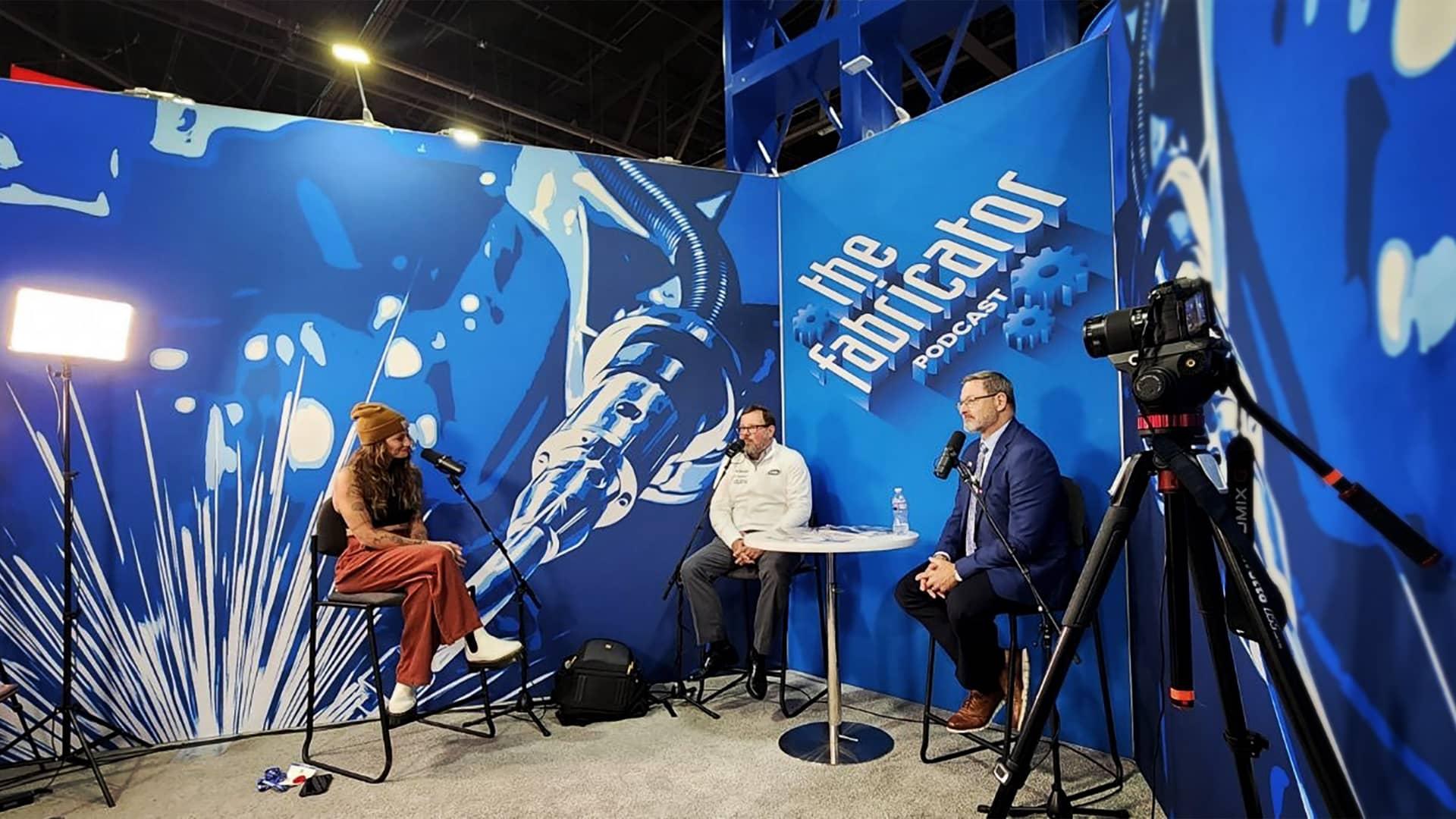
About This Podcast
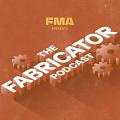
All Episodes
-
 Ep. 055
Ep. 055 -
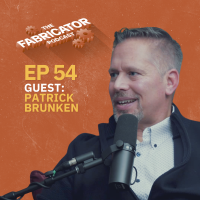 Ep. 054
Ep. 054 -
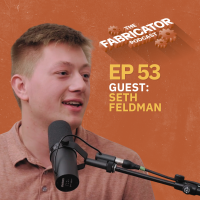 Ep. 053A Gen Zer's take on the trades and representing the toolbelt generation
Ep. 053A Gen Zer's take on the trades and representing the toolbelt generation -
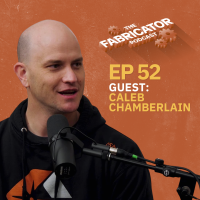 Ep. 052
Ep. 052 -
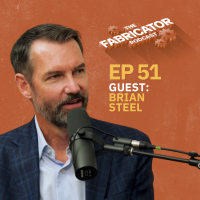 Ep. 051
Ep. 051 -
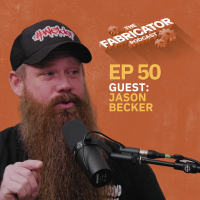 Ep. 050
Ep. 050 -
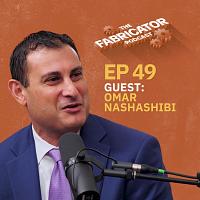 Ep. 049
Ep. 049 -
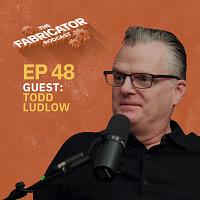 Ep. 048
Ep. 048 -
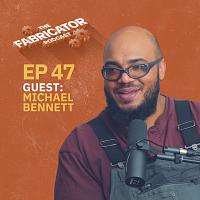 Ep. 047
Ep. 047 -
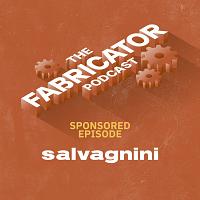 Bonus
Bonus -
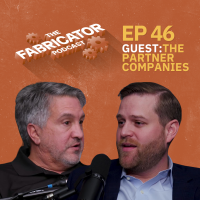 Ep. 046
Ep. 046 -
 Ep. 045
Ep. 045 -
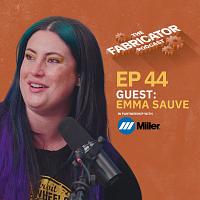 Ep. 044
Ep. 044 -
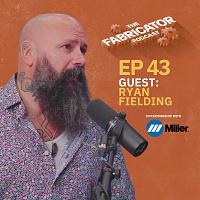 Ep. 043
Ep. 043 -
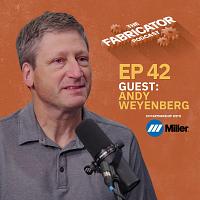 Ep. 042
Ep. 042 -
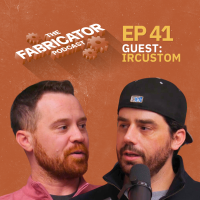 Ep. 041
Ep. 041 -
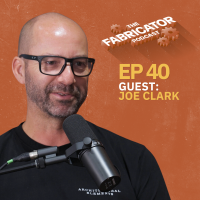 Ep. 040
Ep. 040 -
 Ep. 039
Ep. 039 -
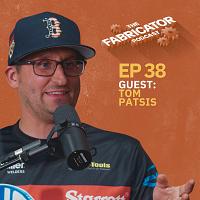 Ep. 038
Ep. 038 -
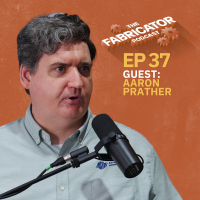 Ep. 037
Ep. 037 -
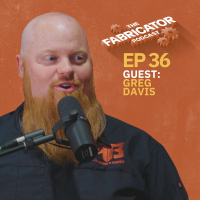 Ep. 036
Ep. 036 -
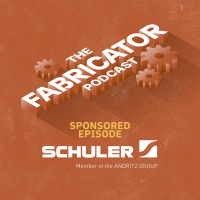 Bonus
Bonus -
 Ep. 035
Ep. 035 -
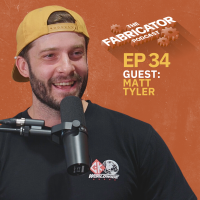 Ep. 034
Ep. 034 -
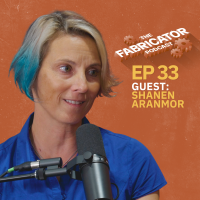 Ep. 033
Ep. 033




